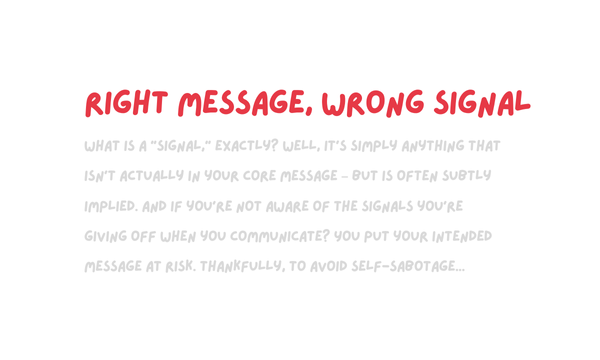📌 How to Tell Senior Leaders They’re Wrong

When’s the last time at work we heard someone preface a contrarian view by saying:
“Just playing devil’s advocate, but…”
Probably not that long ago!
Here’s my suggestion: it’s time to cut this verbiage out of our vocabulary.
Let me be clear. There’s nothing inherently wrong with this phrase per se. In fact, it’s a super useful crutch to rely on when we feel less confident in our voice.
But that’s also precisely the issue. It becomes a defense mechanism that shuts out everybody else in the room.
After all, you’re essentially saying:
“I’m going to make my point, and I don’t care if you disagree with me, because my point was meant to be contrarian anyway.”
So instead of constructive debate, you end up generating silence. And maybe even eyerolls.
Here’s what I suggest doing instead: Keep it simple. Acknowledge that you have a different opinion, but then simply make your point.
Over time, people will respect that you not only have your own point of view, but that you also have enough confidence to not have bubble-wrapped it to protect it from dissent.
To put it differently: think of “devil’s advocate” as a pacifier. Use it earlier on in your career (if you must), but wean off it as soon as possible.
Your goal is not to deliver an unassailable argument to a room so you can sound smart and look good.
Your goal is to deliver a point of view to help the room get closer to the best outcome.
But what if it’s still really hard? What if you’re dealing with leaders with, um, very strong personalities?
Here are 3 phrases I use to make it easier...
1️⃣ “Let me know if I’m missing something, but…”
If I disagree with someone senior but want to do it in a constructive way, I sometimes use this phrase.
Here's why I like it.
First off, it suggests the right amount of humility, without acting like some pushover without an original point of view.
It also subtly acknowledges that the senior person naturally has much more visibility over the wider business, and so I’m almost giving myself permission to make an argument without having to ensure I have the same broader context.
Here’s an example:
“Let me know if I’m missing some context here, but I worry that anchoring on this stat early on will set the wrong expectations for our audience.”
Or, you can also say something to the effect of:
“Maybe I should be thinking about this differently, but I’m not sure these growth assumptions necessarily hold for next year.“
2️⃣ "Can I Pitch You on..."
Sometimes the power distance between yourself and the senior stakeholder is large.
And sometimes they have really strong personalities. And non-trivial egos.
In these cases, you can try saying something like,
“Can I pitch you on another approach for this narrative?”
In a way, you are still seeking permission – just seeking permission to disagree.
And after all, who would realistically say “no” to this request?
3️⃣ "I’m struggling a bit with this point on…"
These are phrases that I love: I use it with my peers as well as more senior folks.
Here’s why. You make it clear that you’re not fully onboard yet with the point being made, but you’re pointing the finger at yourself, instead of explicitly negating other people’s views.
You imply that you actually do want to understand the other person’s point, but you’re still working on it and thus reaching out for a helping hand.
Here's how it might work:
“I’m struggling a little here, as I’m trying to reconcile how we’ll drive scale if we prioritize only the top segment. Let me know if I'm missing any context though?”
Read: I’m not disagreeing with you out right; I’m really trying to understand the rationale behind your suggestion. here’s where I'm "stuck" and would love you to bring me along your thinking.
♻️ If you found this useful, feel free to share it with your friends and colleagues. Thanks for reading!


